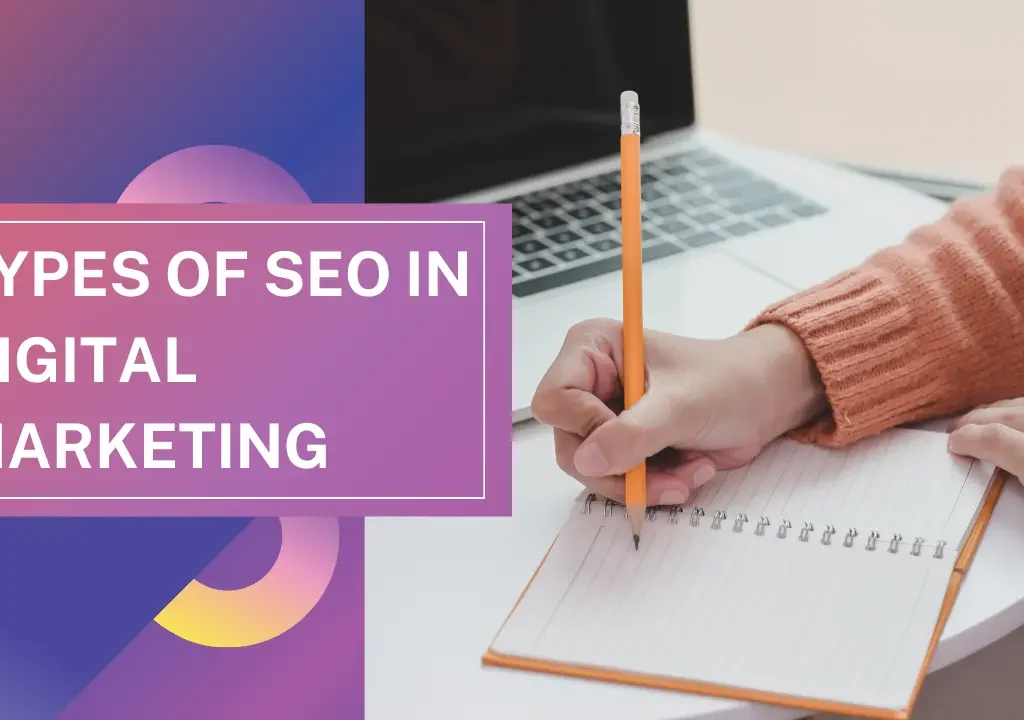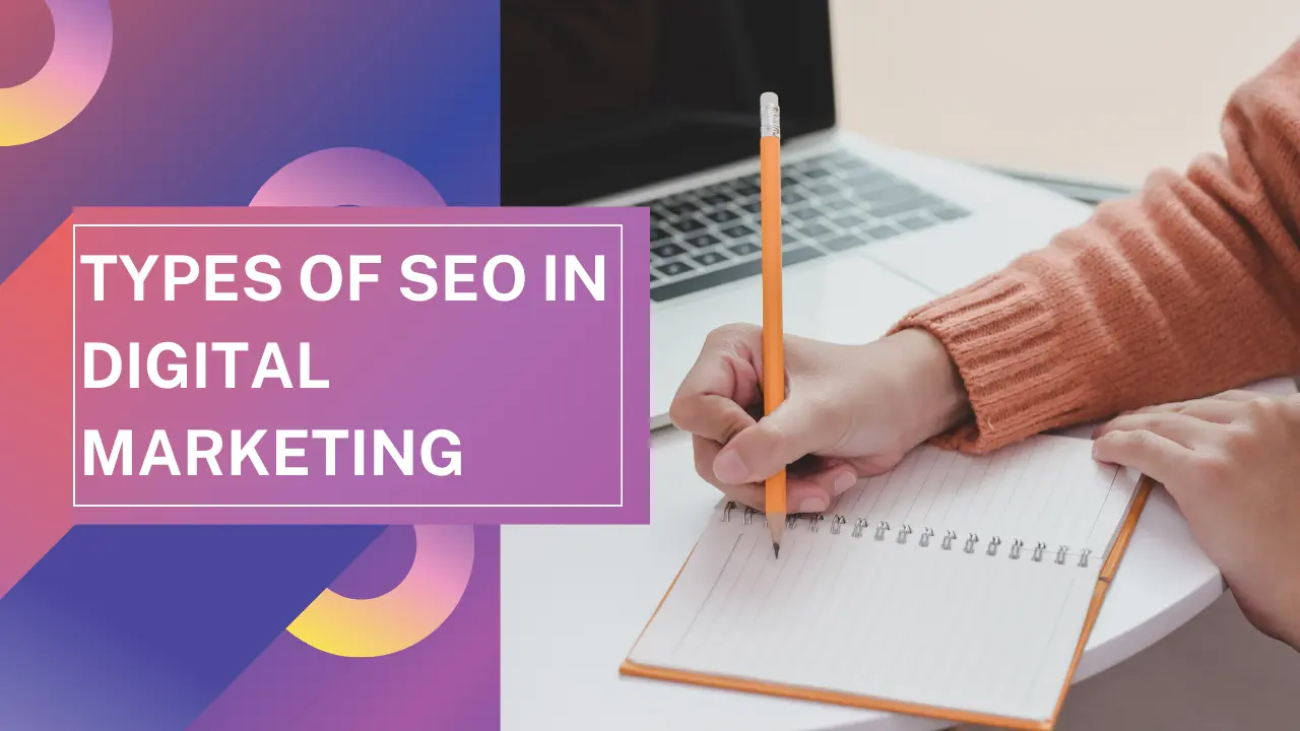Types of SEO in Digital Marketing

Types of SEO in Digital Marketing
Introduction to SEO
Search Engine Optimization (SEO) is the process of optimizing a website to improve its visibility and ranking on search engine results pages (SERPs). There are various types of SEO techniques, each targeting different aspects of digital marketing.
Unlocking the Power of SEO in Digital Marketing
SEO, or Search Engine Optimization, is a critical component of any successful digital marketing strategy. It involves optimizing your website to rank higher in search engine results pages (SERPs), thereby increasing organic traffic and visibility. In today’s competitive online landscape, understanding the various types of SEO is essential for businesses looking to thrive in the digital realm.
Introduction to SEO
SEO is a multifaceted approach that encompasses several key areas, each playing a crucial role in improving a website’s search engine rankings. By understanding the different types of SEO and how they work together, businesses can develop a comprehensive strategy to boost their online presence and reach their target audience effectively.
- On-Page SEO: On-page SEO is the process of optimizing individual web pages to improve their search engine rankings. This optimization includes enhancing meta tags (title, description), structuring headings (H1, H2, etc.), refining URL structures, and ensuring high-quality content. By focusing on these on-page elements, businesses can increase the relevance and authority of their web pages, thereby improving their rankings on search engine results pages (SERPs).
- Off-Page SEO: Off-page SEO comprises strategies performed outside of a website to boost its search engine rankings. These strategies include building backlinks from reputable websites, engaging in social media marketing, and managing online reputation through activities such as handling online reviews and ratings. Off-page SEO signals to search engines that a website is trustworthy and authoritative, which can lead to higher rankings in SERPs.
- Technical SEO: Technical SEO concentrates on optimizing the technical aspects of a website to enhance its visibility in search engines. This optimization involves tasks such as optimizing site structure, ensuring mobile responsiveness, strengthening website security, and improving page loading speed. Technical SEO ensures that search engine crawlers can efficiently access and index a website, resulting in improved search engine rankings.
- Local SEO: Local SEO is crucial for businesses targeting a local audience. It involves optimizing a website for local search queries, such as “near me” searches, and optimizing Google My Business listings. Additionally, managing online reviews and ratings and maintaining consistency in NAP (Name, Address, Phone Number) information across online directories are essential for local SEO success. Local SEO helps businesses appear in local search results, increasing visibility and driving foot traffic to physical locations.
Conclusion
In conclusion, SEO is a critical component of digital marketing that can significantly impact a business’s online success. By understanding the different types of SEO and implementing best practices, businesses can improve their search engine rankings, attract more organic traffic, and ultimately, increase conversions.
Why Invest in SEO?
Investing in SEO is crucial for businesses of all sizes. Here are some key reasons why:
- Increased Visibility: SEO helps your website rank higher in search engine results pages (SERPs), making it more likely to be seen by users searching for relevant keywords. Higher visibility means more opportunities for your website to attract potential customers.
- Higher Quality Traffic: SEO focuses on optimizing your website for specific keywords relevant to your business. As a result, the traffic generated through SEO tends to be more targeted and of higher quality, as it consists of users actively searching for products or services related to your industry.
- Cost-Effectiveness: Unlike traditional advertising methods such as print or TV ads, SEO offers a higher return on investment (ROI) over time. Once your website ranks well for targeted keywords, you can attract organic traffic without continuously paying for ads, making it a cost-effective long-term strategy.
- Builds Credibility and Trust: Websites that appear at the top of search results are often perceived as more trustworthy and credible by users. By optimizing your website for SEO, you can improve its visibility and authority, thereby enhancing trust and credibility with your audience.
- Improves User Experience: SEO involves optimizing various aspects of your website, such as site speed, navigation, and mobile responsiveness, to provide a better user experience. A well-optimized website is easier to navigate and more user-friendly, resulting in higher engagement and satisfaction among visitors.
- Stays Ahead of Competitors: In today’s competitive online landscape, ranking higher than competitors in search results can give your business a significant advantage. By investing in SEO, you can stay ahead of competitors and capture more market share, leading to increased revenue and growth for your business.
Conclusion
In conclusion, SEO is a powerful digital marketing strategy that can help businesses improve their online visibility, attract more traffic, and ultimately, grow their bottom line. By understanding the different types of SEO and implementing best practices, businesses can stay ahead of the curve and succeed in the digital age.
FAQs
- How long does it take to see results from SEO?
- SEO is a long-term strategy, and results can vary depending on factors such as competition, industry, and the complexity of your website. Typically, businesses start seeing significant results within 3 to 6 months of consistent SEO efforts.
- Is SEO suitable for all types of businesses?
- Yes, SEO is beneficial for businesses of all sizes and industries. Whether you’re a small local business or a large e-commerce retailer, optimizing your website for search engines can help you reach your target audience and achieve your business goals.
- Can I do SEO myself, or do I need to hire an agency?
- While some basic SEO tasks can be done in-house, hiring an experienced SEO agency or specialist is often recommended for more comprehensive SEO strategies. They have the expertise, tools, and resources to deliver optimal results and save you time and effort in the long run.
- What are some common SEO mistakes to avoid?
- Some common SEO mistakes to avoid include keyword stuffing, neglecting mobile optimization, ignoring technical SEO issues, and not prioritizing high-quality content creation. It’s essential to stay updated on SEO best practices and avoid shortcuts that could harm your website’s rankings.
- How can I measure the success of my SEO efforts?
- Key metrics to measure SEO success include organic traffic, keyword rankings, conversion rates, bounce rates, and backlink quality. Tracking these metrics over time can help you assess the effectiveness of your SEO strategies and make data-driven decisions to optimize your website further.
- How long does it take to see results from SEO?
- SEO is a long-term strategy, and results can vary depending on factors like competition, industry, and the complexity of your website. Typically, businesses start seeing significant results within 3 to 6 months of consistent SEO efforts.
- Is SEO suitable for all types of businesses?
- Yes, SEO is beneficial for businesses of all sizes and industries. Whether you’re a small local business or a large e-commerce retailer, optimizing your website for search engines can help you reach your target audience and achieve your business goals.
- Can I do SEO myself, or do I need to hire an agency?
- While some basic SEO tasks can be done in-house, hiring an experienced SEO agency or specialist is often recommended for more comprehensive SEO strategies. They have the expertise, tools, and resources to deliver optimal results and save you time and effort in the long run.
- What are some common SEO mistakes to avoid?
- Some common SEO mistakes to avoid include keyword stuffing, neglecting mobile optimization, ignoring technical SEO issues, and not prioritizing high-quality content creation. It’s essential to stay updated on SEO best practices and avoid shortcuts that could harm your website’s rankings.
- How can I measure the success of my SEO efforts?
- Key metrics to measure SEO success include organic traffic, keyword rankings, conversion rates, bounce rates, and backlink quality. Tracking these metrics over time can help you assess the effectiveness of your SEO strategies and make data-driven decisions to optimize your website further.


